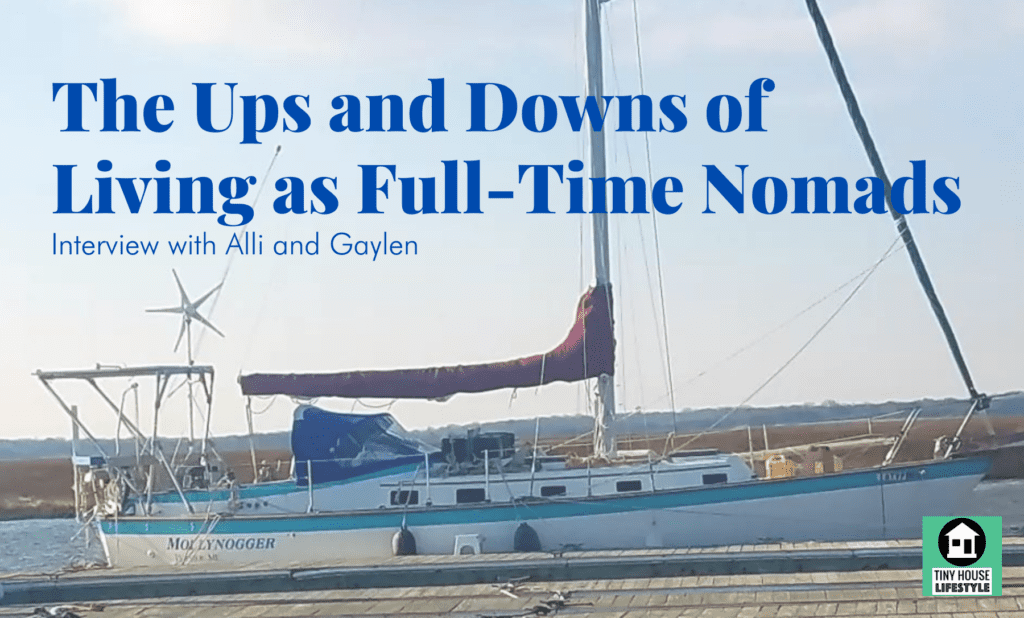
Would you believe me if I told you that it was entirely possible to record an album on a sailboat? Alli and Gaylen are the Sail Bums, a musical duo from Maine who live on their 37-foot Endeavour sailboat. In addition to explaining how they manage their music business while traveling the eastern seaboard, they also give some great advice to nomads on both land and sea and talk about why the nomadic lifestyle is so appealing to them.
In This Episode:
- How they afford to work less than full-time
- Boondocking for boats? It’s possible!
- Managing a musician’s life onboard
- Storage tips to stay stocked, clean, and dry
- Marinas are helpful for all types of nomads
Links and Resources:
- sailbumsmusic.com
- TheSailBums.wordpress.com
- United States Coast Guard Auxiliary
- ActiveCaptain
- Navionics
- Waterway Guide
- The Boat Galley
Guest Bio:
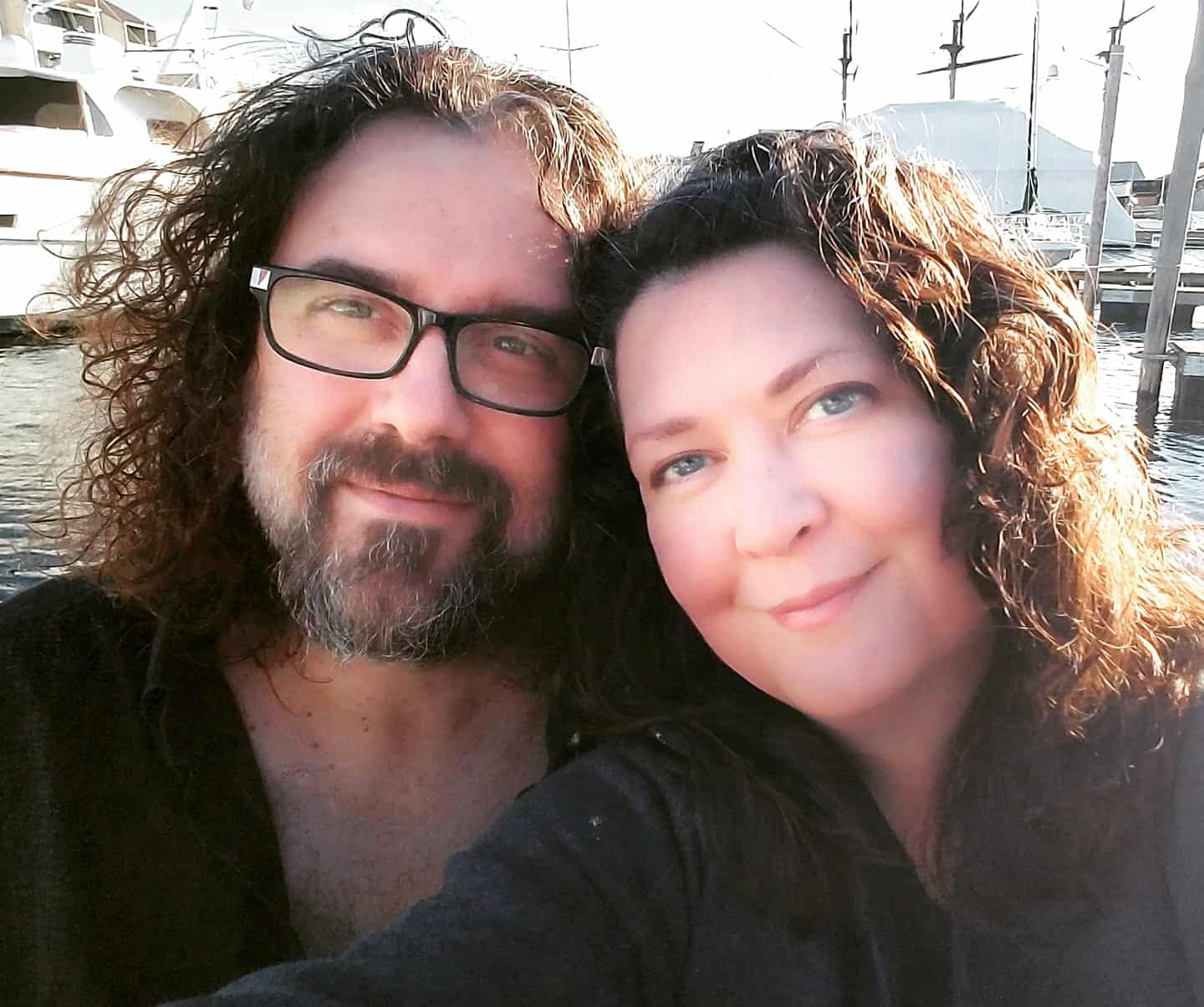
Alli and Gaylen
Alli and Gaylen are The Sail Bums, a musical duo from Maine, who live and travel the eastern seaboard on their 37-foot Endeavour sailboat. They've been together for more than 20 years and playing music together for around 24. And in October of 2020, they jumped on the sailboat they'd been working on for nearly 3 years and never looked back. They fell in love with the ocean, traveling, wandering aimlessly, and experiencing life from a minimalist, low-cost and flexible perspective.
This Week's Sponsor:
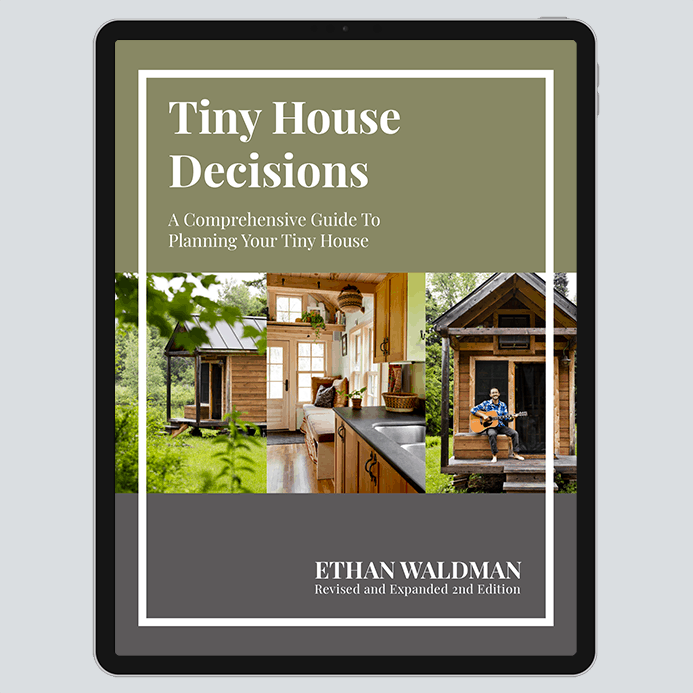
Tiny House Decisions
Tiny House Decisions is the guide that I wish I had when I was building my tiny house. And it comes in three different packages to help you on your unique tiny house journey. If you're struggling to figure out the systems for your tiny house, how you're going to heat it, how you're going to plumb it, what you're going to build it out, then tiny house decisions will take you through the process systematically and help you come up with a design that works for you. Right now I'm offering 20% off any package of Tiny House Decisions for podcast listeners. Head over to https://www.thetinyhouse.net/thd and use the coupon code tiny at checkout!
More Photos:
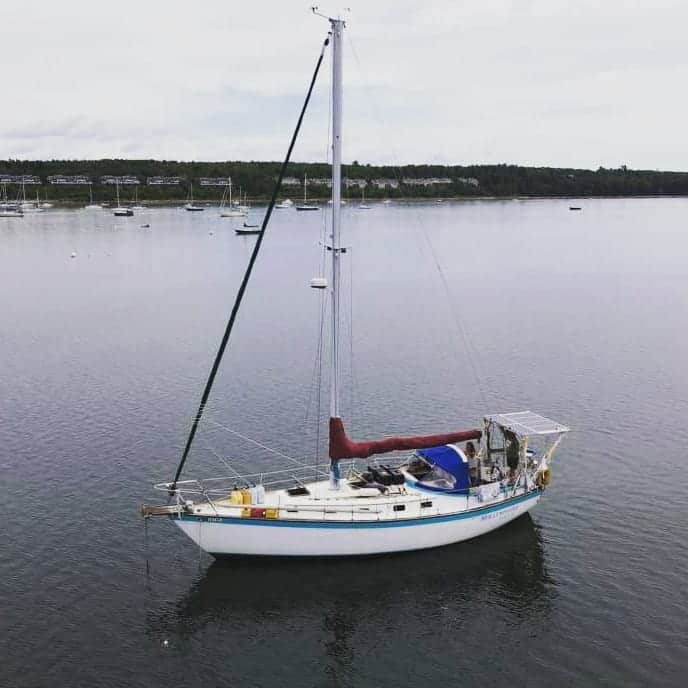
Photo credit: Steve Bond
Mollynogger is Alli and Gaylen's full-time home
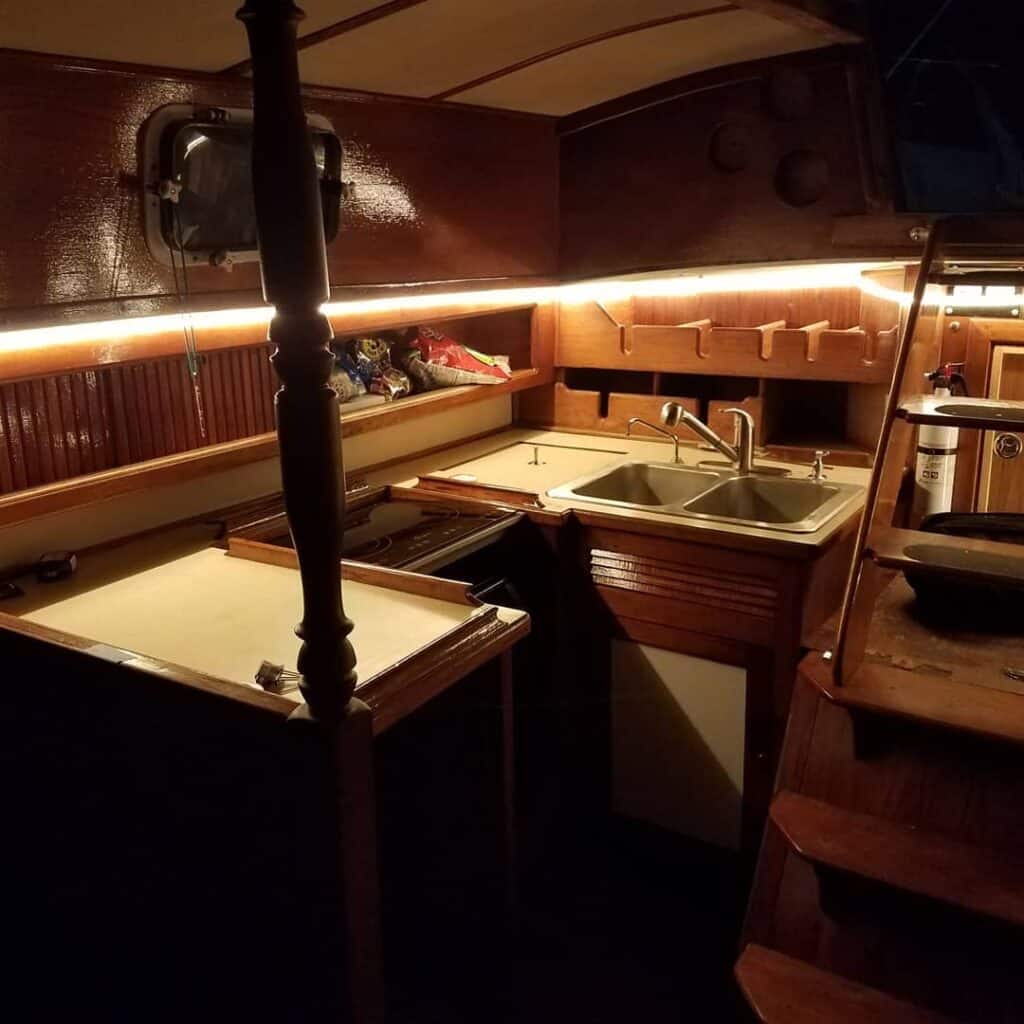
Alli gives some amazing food storage tips in the interview
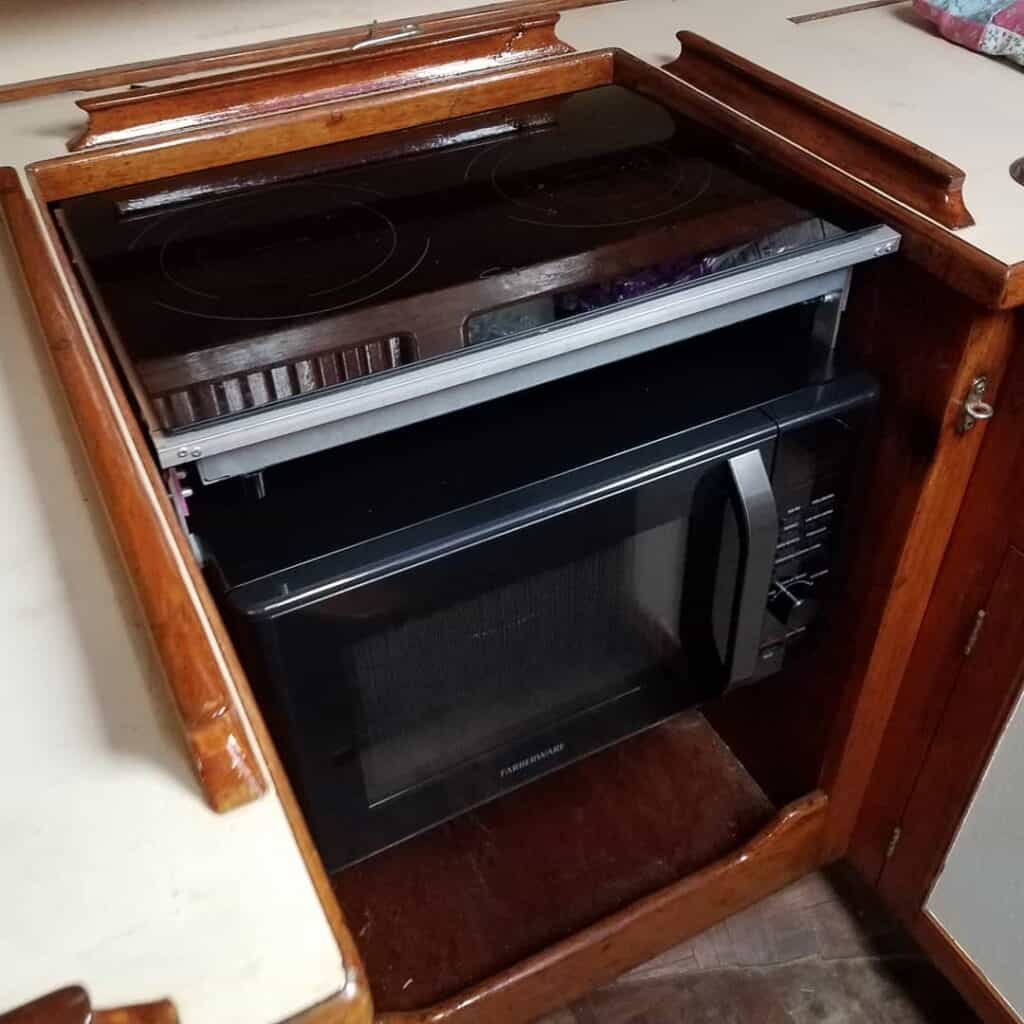
They can even bake bread in their oven!
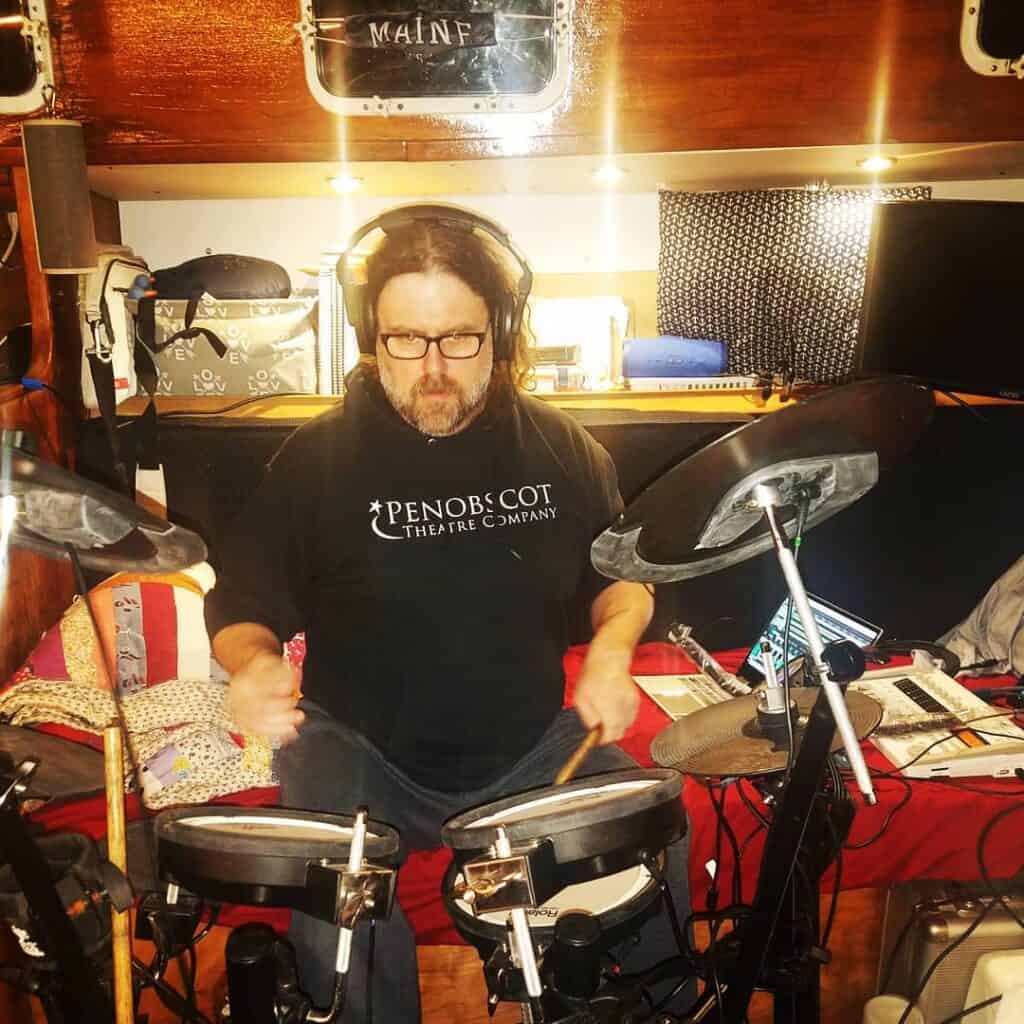
The Sail Bums are recording a new album while aboard their boat
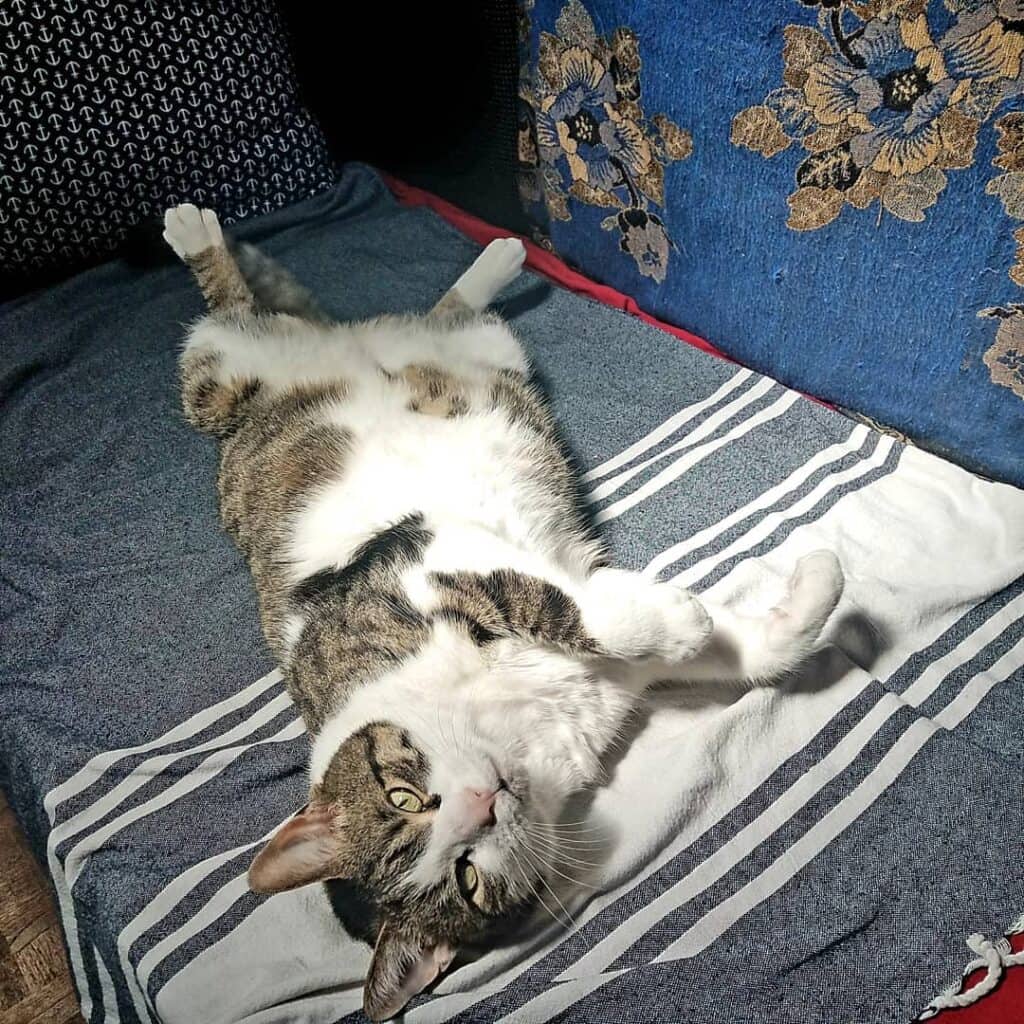
Ensign Pickles loves being on deck
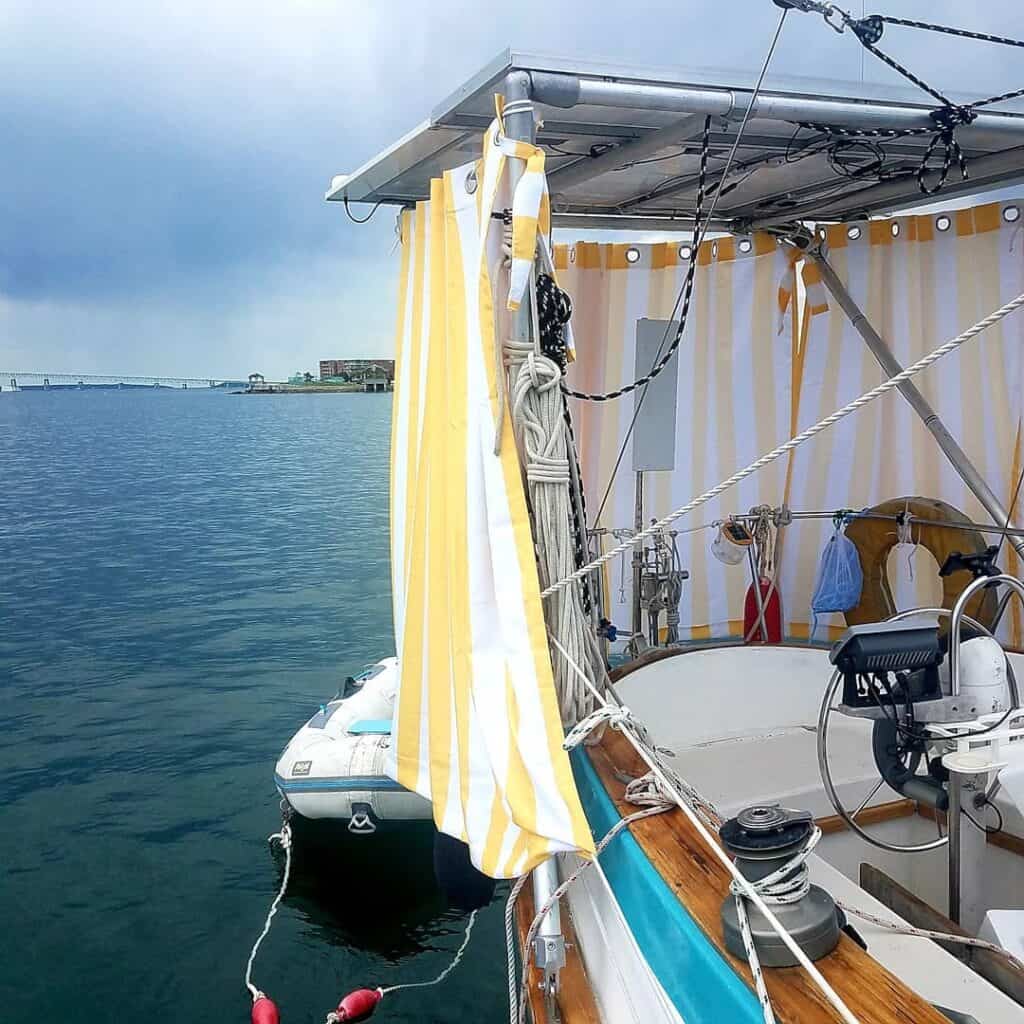
Cute curtains turn the solar structure into a cabana
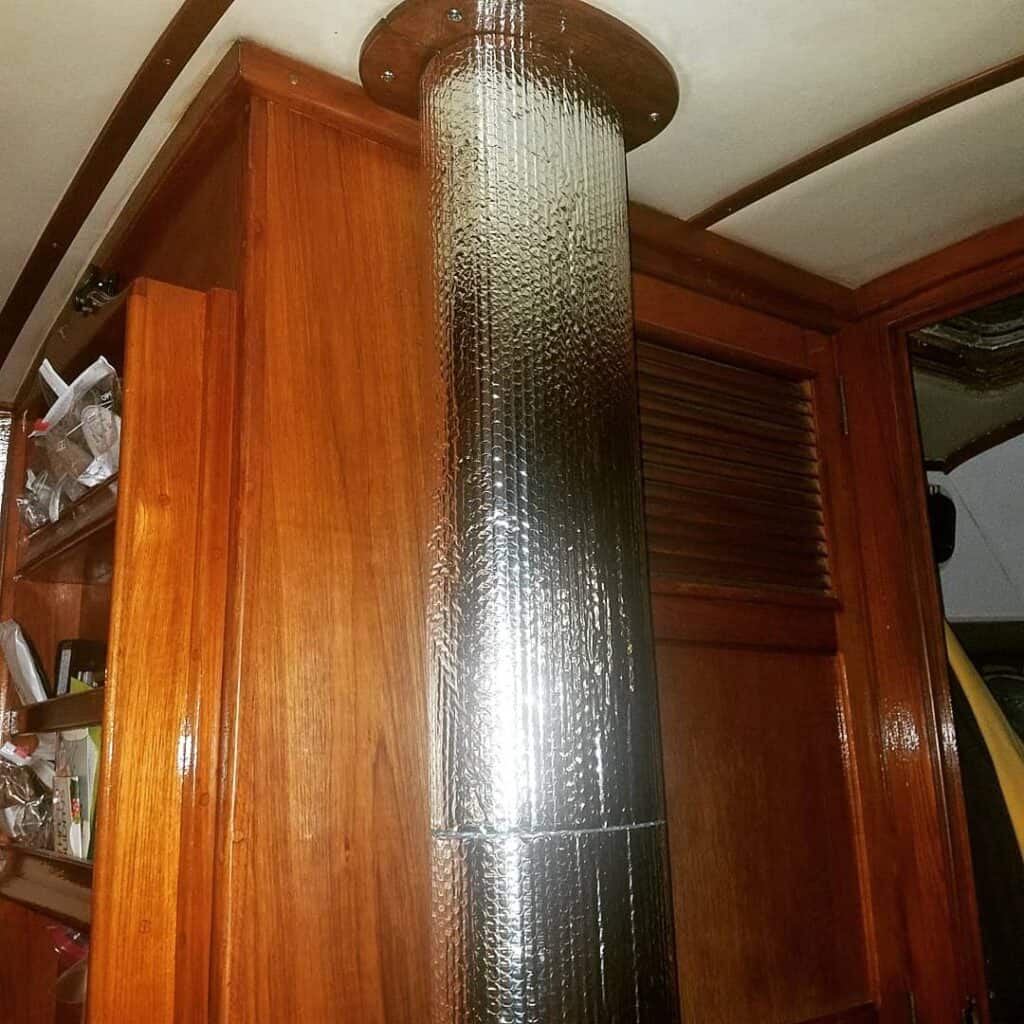
Allison Bankston 0:00
One of the reasons we chose it is because we have a whole bunch of windows that open up on either side of the boat. And we get a tremendous breeze when we're out on the water. So we don't have to have, even in 90 degrees, we don't need air conditioning, we just open up the windows.
Ethan Waldman 0:15
Welcome to the Tiny House Lifestyle Podcast, the show where you learn how to plan, build and live the tiny lifestyle. I'm your host, Ethan Waldman, and this is episode 217 with the Sail Bums. Alli and Gaylen are the Sail Bums, who are a musical duo from Maine who live and travel the eastern seaboard on their 37-foot Endeavour sailboat. In this interview, we talk about what it's like to be a musical performer while traveling on a boat. How Ali and Galen make their living while living full time on the boat. And just generally about why the nomadic lifestyle is so appealing to them, and why they continue to seek it out. It's a really fun conversation. And I hope you stick around.
I want to tell you about something that I think will be super helpful as you plan, design, and build your tiny house. Tiny House Decisions is the guide that I wish I had when I was building my tiny house. It comes in three different packages to help you on your unique Tiny House journey. And if you're struggling to just figure out the systems for your tiny house, you know, like how you're going to heat it, how you're going to plumb it. You know what construction technique are you going to use like SIPs or stick framing or steel framing, Tiny House Decisions will take you through all these processes systematically and help you come up with a design that works for you. Right now I'm offering 20% off any package of Tiny House Decisions for listeners of the show, you can head over to thetinyhouse.net/THD To learn more, and use the coupon code tiny at checkout for 20% off any package. Again, that's thetinyhouse.net/THD and use the coupon code tiny for 20% off
All right, I am here with Alli and Gaylen from the Sail Bums. Alli and Gaylen are the Sail Bums, a musical duo from Maine who live and travel the eastern seaboard on their 37-foot Endeavor sailboat. They've been together for more than 20 years and playing music together for around 24. And in October of 2020, they jumped on the sailboat they've been working on for nearly three years and never looked back. They fell in love with the ocean traveling, wandering aimlessly and experiencing life from a minimalist, low cost and flexible perspective. Alli and Gaylen, welcome to the show.
Gaylen Bankston 2:44
Hi, thanks for having us.
Ethan Waldman 2:46
Yeah, thanks for being here. So your timing couldn't have been better. Because I feel like in October of 2020, there were a lot of people who were desperate to get the heck out of wherever they were. But it was hard to buy vans. I'm sure it was hard to buy sailboats. But you'd been working on your boat for three years. So can you kind of give us the the more extended version of the story in your bio?
Gaylen Bankston 3:11
Yeah, well, we, we bought our boat, knowing that it was going to be a fixer upper. And we would have to - in the boating world it's called a refit. You have to, like replace a lot of the systems and things like that to make her sea worthy. We felt naive. We thought it was going to be like a oh, maybe a two month process, you think?
Allison Bankston 3:37
Oh, I think we probably thought it was going to take the better part of a year but definitely not more than that. You know?
Yeah.
Not three, that's crazy!
Gaylen Bankston 3:44
Not three. We kept - everybody kept asking us, "So when's it gonna be ready?" We kept saying, "Oh, a couple of weeks." No, not so much.
Allison Bankston 3:52
Three years later, we were finally done. And we were in the middle of the pandemic, of course, and there were a lot of people who didn't want to get on their boat and go at that point in time. They thought it wasn't safe. You need to stay home, you need to be protected. But the way we thought of it, we're going to be on the boat 95% of the time, quarantined on our own. It's probably even safer to be on the boat than it is to be at home and going out and doing errands all the time.
Gaylen Bankston 4:18
Yeah.
Allison Bankston 4:18
So we just took the leap.
Gaylen Bankston 4:19
I have to agree with you. Yeah, it couldn't have been a better time to do it really.
Allison Bankston 4:23
And it also meant that places weren't so congested and the cost of boating went down considerably. Like we were able to stay at certain marinas and things like that for a lot less because they were just desperate for any customer.
Ethan Waldman 4:35
Interesting. Yeah, so that's it seems like a little bit counterintuitive or opposite of maybe like tiny houses and vans. I feel like the demand exploded. Campsites were full. That kind of stuff. Do did you find that are you finding now that there's kind of a I guess backlash isn't the right word but pent up demand for it? Anchor spots, moorings, services, all those kinds of things.
Gaylen Bankston 5:04
I think I think that's a correct, yeah, I think I agree with that statement. Right now, though, it's hard to tell because we're in the middle of the spring migration of people coming north from like Florida, South Carolina and people that were in the Bahamas, want to come up and cruise on the like the Chesapeake. Not so hot. And up to Maine, where were we were from, but we're kind of, as usual, kind of going against the stream here.
Allison Bankston 5:35
We're going down while everyone's going up.
Gaylen Bankston 5:37
But it's the anchorages are definitely full. But I think it's more because of that. I don't really see a slowdown here, that's for sure.
Allison Bankston 5:48
No, I will say I have a lot of sailing female friends that I connect with on Facebook. And what I've heard a lot from them is that it's almost impossible to find a used boat right now. Like the same thing that that you folks we're seeing in the van community in the in the land nomad community, we're seeing now with boats. It's just really hard to find used ones that are worth fixing up or they're ready to go. They just can't find them.
Ethan Waldman 6:14
So had you been into boating before you set sail in 2020? Or what prompted you know this? This whole shift to begin with?
Allison Bankston 6:26
Yeah, so we started sailing. I think it was around 16-17 years ago up in Maine, which is a big coastal community in general anyway, and we loved sailing. And we sailed on a smaller vessel, a 27 footer, and then a 22 footer, that we could trailer and just keep in our driveway, if we weren't using it, which was great. And somewhere along the way, we just learned really early on, we wanted to do this life. We wanted to live aboard, travel around live a more minimalist lifestyle. We've been musicians for years, you know, for decades. And we thought you know, we can do this and travel around and make our living doing this and a few other things, and not have to have nine to five jobs, and two cars and a mortgage and all the things that go along with it. And I'm so glad that we made the decision to make it happen.
Gaylen Bankston 7:15
And I think for me the right from the right from the get go. I always had my eye on this. It wasn't like a definitive plan, per se. But when we bought our first boat, which we hadn't sailed before, we hadn't. We knew nothing. We we knew nothing. And I got on eBay. And we decided we needed to buy a boat a sailboat. And we did. And it was a blue water cruiser.
Allison Bankston 7:43
Like made for being out on the ocean.
Gaylen Bankston 7:44
Yeah, yeah.
Allison Bankston 7:45
Serious sailing.
Gaylen Bankston 7:46
And even though it was smaller, but I always had my eye on Yeah, that this is this is something I want to do eventually is to is move aboard and get rid of get rid of the house and all all of the things we've accumulated and kind of kind of be more self sustaining.
Allison Bankston 8:06
And our first boat we bought down in Quincy, Massachusetts, sight unseen. Most people when they buy a boat, they have a survey done. It's like a whole process to make sure it's sea worthy and stuff. And we were idiots, and we just bought it on eBay sight unseen. And then over five days, we brought it back to Maine with no sailing experience, which is crazy as I look back on it, but it was such an amazing experience. And we learned more in those five days of sailing than we probably would have in three years of summer sailing in Maine. Just because it was such a crash course and everything.
Gaylen Bankston 8:41
Yeah,
Allison Bankston 8:42
Luckily, we survived.
Gaylen Bankston 8:44
I guess I wouldn't recommend doing it that way. But what I do recommend is doing it and you know, getting getting out there and finding a way to do it. Because if your heart's calling you to do something like this, and don't don't think you need big pockets. You can you can do it on a short budget. And you just need to figure out how to how to make it happen. Talk to people.
Ethan Waldman 9:08
Did you have to switch, you know, how you made your living before you left? Or were you already working in ways that were conducive to remote work?
Gaylen Bankston 9:22
That's that's interesting. I think the big thing was being out from under so much debt, like mortgages, car payments, things like that helped out we didn't need nine to five jobs. At that point. We could make our living doing what we've always kind of done on I guess I've done it more full time but newer, more part time doing music. But I that became more of our full time gig once we once we moved aboard. My background is in engineering and physics. And I've always been a tutor. So what I, what I did is I started my own online tutoring business for math and math and physics. And that is carried us over and supplement our income when, you know, during times, you know, because in different different times and COVID, you know, the gigs dried up, by having having that helped us out and, and Alison also has some side hustles.
Allison Bankston 10:35
Yeah, so I spent about 20 years in broadcasting, and then did a bunch of marketing positions. And so I do voiceover work remotely. So I voice commercials for people right here on the boat. And I also work part time as a magazine editor for a magazine out in Arvada, Colorado, all remotely, you know, done. And so it's kind of nice, we can do both the tutoring, and that work right here from the boat. And then if we have the music going on, on top of that, we live very comfortably. And yet, we're not working full time. You know, there are sacrifices involved with that we don't have benefits, you know, there are things that we gave up and choose to live without, because we just don't feel like we need it right now. That may eventually bite us. But right now, it's more important for us to have the freedom to be able to experience life out on the water, meeting people everywhere we go, making friends in this really unique way. It's fantastic.
Gaylen Bankston 11:33
We love it. And we spend a lot of time staying in anchorages rather than the marinas. So that I mean, because I mean, if you're staying at a marina...
Ethan Waldman 11:44
Can you explain that for for non-boat people, like anchorage versus marinas?
Gaylen Bankston 11:50
I guess, um, I guess boondocking would be the analogy.
Ethan Waldman 11:55
Okay.
Gaylen Bankston 11:56
So yeah, so we're out in, in an area kind of off off the channel, off the main road, so to speak, where we can safely drop an anchor, have it, you know, go on the ground, we're attached with a chain to it. And so we're, if you do it, right, it can, I mean, it's last, we've gone through hurricane force winds on our setup, and it's been fine.
Allison Bankston 12:27
Or you can choose to go to a marina and spend a lot more money and be at a dock. So you could drive your boat up to a dock and you can just step off onto land. And some people really love that convenience. A lot of times you also get showers and laundry and things like that in combination with the dock space. So that's very enticing to people, but it gets really expensive. So living the way we do and walking a mile sometimes to a laundromat or to a grocery store and things like that, it it allows us to live much more cheaply.
Gaylen Bankston 13:01
And there's a there's a place in between there where you can pay for a mooring and what that is, is it's a it's basically a permanent anchor in the ground. And usually like one of the marinas will own that and you you pay them anywhere from $40 to $80 a night to stay on on that mooring and that gives you you know if you're not comfortable anchoring because not everyone is that gives you the peace of mind supposedly that you're going to you know wake up where you went to sleep and but if you're usually closer to town and usually have the the you can use the showers at the marina and oh my god that's the big thing is finding where to take showers that's like gold. Yeah, because you know when you're at the anchorage and some arenas will let you pay like you know, anywhere from $12 to $15 to come in and you can use their laundry facilities and their their showers and stuff and
Allison Bankston 14:07
that might even be helpful to some folks who are nomads by land, you know living the van life and things like that. A lot of times marinas, you can pay $12 to $20 and have a daypass and then you can use their laundry and their showers and sometimes they even have a vehicle that you can use to go shopping if you if you don't have one.
Gaylen Bankston 14:28
Oh that's a great tip. Yeah,
Allison Bankston 14:31
I don't I'll do that but when the when we find one that does it. It's like gold you know $12 bucks and we can park our dinghy there a little our little inflatable boat that we take between our house in our a boat and land and then we can have all those amenities. That's a really big deal.
Ethan Waldman 14:48
So as musicians, I'm curious, you know what, what instruments do you have a board and did you have to cull the the lineup for life at sea?
Gaylen Bankston 15:04
Well, we have a lot more than you'd expect. We're kind of in the middle of, of recording an album. While we're doing this and that was, that was the big thing is we wanted to write all our all of our songs we write about our experiences as we as we go down, and it's, it's something I wanted to capture, I wanted to record that. So I have, let's see, we have a, our for a live set up, we have a guitar and a keyboard, she plays keyboard, I play guitar. And that's our sound system. Yeah, of course, the sound system. And we have one of those little, you know, little ones that looks like a little tower that comes up an array, you know, good for a small, small club or something, we
Allison Bankston 15:51
have our live setup, whittled down and purposely bought things that were very easy to carry. Like we I have a keyboard with a backpack case that smaller, you know, he's got his guitar, we've got our sound system, and we've got it down so that the two of us can carry it on our backs and enrolling carts. As soon as we get to land to whatever gig. So as long as our gig is like a mile or less, from the marina that we come up to or whatever, we can generally just walk to our gigs, which is really rare. And we're a little bit of a spectacle when we do it.
Gaylen Bankston 16:23
Yeah. And it will especially when we put everything in the dinghy. So the dinghy is a it's how we get from our big boat to land when we're in the anchorages. Yeah, it's an inflatable. I know sometimes people get, you know, like a kid's toy. When I say inflatable, but it's up. You know, it's,
Allison Bankston 16:42
it doesn't look like a flamingo or anything.
Gaylen Bankston 16:44
No, it doesn't. But that would be cool. I would love that. But we so we get we have all of our gear. It's in this with us just barely. But it's a big spectacle when we go through the rest of the anchorage and make our way up. And people start yelling at where you guys planned. And I will tell them and they're like, oh, no, you know, so we usually gather a small crowd just from going to our gigs. But yeah, that's something people might not think about too is we? Yeah, we don't have. We don't have cars, we don't have vehicles. So whenever we do a gig, we have to arrange a place to you know, docks to park the dinghy at. And then we have to carry we have to lug all of our stuff, wherever we're going and lug it back at night.
Allison Bankston 17:29
Once. Once in a great while. There's a gig that's good enough paying and it's a little bit further away that will Uber to it. But that's that's a rarity. Most of the time we just walk and onboard in addition to that, so Gaylen spent a lot of years and I did some of this, but he did a lot of it, working for professional theatres doing pit work. So you go to see a live musical and he'd be in the pit playing the music live. He's also a drummer and a bass player and plays banjo a bunch of other things. And he has a full electric drum kit on board. And we've been using that for our recording project suite. So I've got video of him in the middle of our boat with a whole you know, drum set setup, which is something you don't normally see on a sailboat.
Gaylen Bankston 18:11
Yep, and a bass. I got my bass, and on the coolest thing we just got and this is so cliche. So forgive me for this, but I bought, I bought a ukulele. And I was like, "I'm not gonna I'm not gonna be that guy." But I'm totally that guy. And it is so cool. It was like one of these Indiegogo startup things. And it was like this modern wasn't made out of carbon fiber, carbon
Allison Bankston 18:38
fiber. It's like mint green. And it's so
Gaylen Bankston 18:41
cool. Yeah, so that's most of the time it's sunset. You'll see me out in the in the, in the back of the boat. Nice swaying that and having a sundowner and, yeah.
Ethan Waldman 18:54
Is it a Klos? K-L-OlS?
Gaylen Bankston 18:57
Oh, no. ukulele? No, it isn't. But we were just on a friend's catamaran and they had one of their guitars.
Ethan Waldman 19:03
Yeah. Actually, I have the Klos travel guitar and their ukulele. I love them.
Gaylen Bankston 19:09
Oh, that's so cool. I would love to have their travel guitar.
Ethan Waldman 19:13
Yeah.
Gaylen Bankston 19:13
I ended up buying a.
Ethan Waldman 19:14
Yeah.
Gaylen Bankston 19:15
I went in to buy a travel guitar or actually I went into buy like a smaller like parlor guitar. And I sat down and while I was waiting for the guy to bring back the guitar I wanted. I grabbed a guitar I have now I played one chord on it and said, "Yes." And I, I just bought it right there just because of the sound. So it's this giant Dreadnought guitar. Like, Oh, well.
Allison Bankston 19:45
But it's great for busking. So anybody that doesn't know busking is when you street perform, and just you know, put the guitar case out there and we don't do a lot of that but once in a while and it has great sound for anything acoustically like that.
Gaylen Bankston 19:59
I guess Yeah, yeah, the bigger the guitar case more money.
Allison Bankston 20:02
Well, there you go. There you go. And it's got one of those settings where it sounds like it's being amplified even though it isn't. Yes, that big boomy awesome sound
Gaylen Bankston 20:11
yeah has reverb like, and the ukulele does too as reverb built into acoustically. So you don't need to plug it in two reverbs. So it's really cool. And the other selling point on that ukulele is it. All of the frets have different lights on it. And you can hit this thing and it puts on a light show. And it's the stupidest thing in the world, but I love it. So
Ethan Waldman 20:34
Sometimes the novelty is important.
Allison Bankston 20:38
Again, if you're playing a guitar to
Ethan Waldman 20:40
pick up the instrument, yeah,
Allison Bankston 20:41
if you're if you're playing a darker street and busking and hoping for some tips, they might be like, "Oh, what's that?"
Ethan Waldman 20:48
Do you ever do live performances from the boat?
Gaylen Bankston 20:53
Well, you know, we, we haven't done one right off the boat. And that just is that is just because we we've been isolated so much. Getting down. Getting down here. And we just been in anchorages where there hasn't been a lot of people now that we have a lot of people around us. Yeah, I think we're going to be doing more of that and putting up a little Venmo thing on the outside and, and just having people raft up behind the boat and having a party.
Allison Bankston 21:27
Yeah, and we have done a lot of online concerts from the boat. You know, during the pandemic, of course, when everybody that was a musician was playing online, we did a lot of that as we were traveling.
Ethan Waldman 21:39
Yep.
Allison Bankston 21:40
And our story is kind of interesting. I won't go into the whole thing. But if anybody wants to follow our story, you can find us on on Insta and Facebook and on WordPress under Sail Bums. And we had a little bit of a harder time getting down to the southern nice temperatures than we should have one of losing our engine and going through a winter at one point with no heater 18 degrees in Cape May, New Jersey and and not having a marina that would take us in so it was kind of a crazy winner. The folks that have followed us have been like, "Oh, thank goodness, you're down and warm temperatures and we're safe." And we're just really relishing and being in nice conditions and looking forward to being in busy anchorages and hanging out with you.
Ethan Waldman 22:23
That's awesome. Well, I'm glad to hear that you. You made it through that sounds. That sounds really rough.
Gaylen Bankston 22:29
It was a little rough. Yeah,
Allison Bankston 22:30
we it just made us better and hardier sailors and more resourceful, I think. And we appreciate the really nice conditions better.
Ethan Waldman 22:40
I'll bet. And now now that you're kind of sweating it out in 90 degree weather. Maybe you you have fond memories of 18 degrees.
Gaylen Bankston 22:49
Got Yeah, no,
Allison Bankston 22:51
no. And we're not complaining about the 90 degree that's for sure. Yeah.
Gaylen Bankston 22:55
I'll take it. You know, 90 degrees isn't? Yeah, if we're stuck outside, if something happens. It's not a we're not going to die. We're just might be a little uncomfortable. But 17 degrees, man. No, thank you.
Allison Bankston 23:10
So that's something that's kind of interesting in terms of, of tiny living, that's very different on a boat. So one of the reasons we like being at anchor and being out away from land a little bit, is because we get great airflow. So our boat, one of the reasons we chose it is because we have a whole bunch of windows that open up on either side of the boat. And we get a tremendous breeze when we're out on the water. So we don't have to have even in 90 degrees, we don't need air conditioning, we just open up the windows and we get a lovely cross breeze. And that's something you don't always have the advantage of on land. But having that ventilation makes a huge difference.
Gaylen Bankston 23:48
Yeah, we can it can be in the in the 80s. Approaching 90 And it'll be it'll be in the 70s in here. No prob very comfortable.
Ethan Waldman 23:56
Very nice. Yeah, I would imagine that the water to helps to cool the boat down.
Allison Bankston 24:04
It does up until like, just in the last two weeks or so we're suddenly in water that when you put your hand at it, it feels like bath water. We're like, "Oh, this is nice."
Gaylen Bankston 24:15
Yeah, but still the water is 70 to 75 during the day. So I mean, if it's if it's approaching 90 That that's still cooling off the bottom of it. But but you know on days when it does, because I mean it's springtime here and it occasionally has dipped down to you know, the 50s Some nights I don't think it's going to do that again for a while. But when that does it's it doesn't feel like I mean it's easy to keep the boat warm. We don't we don't have to turn on the heater. Because we it's like radiant heating and the floor because the floor you know is still like 65-70 degrees and just keeps the heat coming up through so it's yeah, it's actually really nice.
Ethan Waldman 24:58
Nice.
I'd like to tell you a little bit more about Tiny House Decisions, my signature guide and the resource that I wish I had when I was building my tiny house. It starts with the big decisions, which is, you know, should you build a tiny house yourself or with help is a is a prebuilt shell a good idea? Is a house on wheels better than on the ground and what works better for you? Deciding on the overall size, deciding on whether you should use custom plans or pre made plans, different types of trailers and more. Then in Part Two, we get into the systems - so heat, water, showers, hot water, toilets, electrical, refrigeration, ventilation, and we're only two thirds of the way through the book at this point. From systems we go into construction decisions - talking about nails versus screws, SIPs versus stick framed versus advanced framing versus metal framing. We talk about how to construct a subfloor, sheathing, roofing materials, insulation, windows, flooring, kitchen... I know I'm just reading off the table of contents. But I just want to give you a sense of how comprehensive Tiny House Decisions is. It's a total of 170 pages. It contains tons of full color drawings, diagrams and resources. And it really is the guide that I wish I had when I was building my tiny house. Right now I'm offering 20% off any package of Tiny House Decisions using the coupon code tiny, when you head over to thetinyhouse.net/THD, that's THD for Tiny House Decisions. Again, that's coupon code tiny when you check out at thetinyhouse.net/THD.
So back to the kind of question of making a living and money, do you have like a target, you know, kind of daily budget of like how much you try to spend per day or per week or per month at doing this? Or is it more just kind of dynamic and you just when you need when you need a marina, you go for it when you don't, you don't.
Allison Bankston 27:05
I think one of the advantages to our lifestyle is that it's not as easy as just going down to the local coffee shop and blowing $25 bucks on fair fries and fancy coffees and stuff. Because we might not actually go to land for three or four days, sometimes longer. So that takes some of the temptation away to blow money easily. And we're more likely to stock up on things once every couple of weeks and have a better idea of what we really need and what we use on a regular basis. So I think we tend to focus more on not just necessities, like you know, we were on land today and I bought things like sesame sticks for snacks. We don't need sesame sticks. I like sesame sticks. We just got some but but but I'm also you know not blowing 200 bucks on groceries that we don't need. I'm I'm kind of deciding what's good within our budget is going to be appropriate for the next couple of weeks to make sure that we have what we need and a few things that we like.
Gaylen Bankston 28:05
And it's threefold we have to be very deliberate in what we buy number one, budget number two space storage space on the boat. And number three, we have to we have to transport it from the store to the to the boat, and that can be you know, we have two rolling carts and two backpacks and that those carry a lot. But you know, we fill up a grocery cart that's you know, that's a lot of space. That's a lot of that's a lot of space. That's a lot of lugging that's a lot of room in the in the dinghy to bring it over here. And then once we get here I mean Alison's a master putting, she knows where everything is, and things are hidden in so many people and it's so funny the other night. We hadn't we haven't provisioned in a while and like she she was sitting there eating while she's eating something. I'm like, What are you eating? pistachios? I'm like, "When did we get pistachios?" It was like way back when somebody sent us some pistachios. I'm like, "This is awesome!"
Allison Bankston 29:18
And I'm really good at hoarding snacks like that. So that if it's been a while since we've had a treat, I'm like, Oh, I've got those pistachios that our friend Robin sent us and a care package. This is great.
Ethan Waldman 29:29
Nice.
Gaylen Bankston 29:30
Sometimes we'll just find stuff in like little areas and be like, Oh, we got this!
Allison Bankston 29:34
I forgot I have granola. But in answer to your question, I think I tend to think of it more like a long term budgeting like I know I've got this much money over the next two weeks. And then if we can go to land and we can get to a good store then I'm thinking about is it a store where the prices are good? Should I get more stuff because we might not find these good prices in the future or in the near future? Or should I just buy a few things because the prices aren't very good here. And I should wait. So I do a lot of thought process process like that. And we have to think about provisioning really differently on the boat to like, I take the labels off of all the cans and write the like you have like corn, beets, whatever on the top of the cans. Because bugs really like that moist kind of environment of a boat. And you don't want bugs on your boat, because it's a small space, right? So they like to lay eggs behind the labels. And also the labels can get wet and get kind of disgusting, if they're stored lower in the boat. So most people who live on their boats full time you take the labels off the cans and just use a sharpie to mark what the can is. So I have an entire set here in the boat that's like a couch on one side of the boat, and underneath of that as storage space. And that's pretty much just lined with canned goods.
Ethan Waldman 30:55
Wow, that's quite a tip.
Allison Bankston 30:57
And double bagging things to double bagging things with ziplocks, which I reuse. So that we if we just we haven't had in two years, we haven't had any major bug problems. And I think it's because I've done those extra steps to make it so that there is an issue.
Gaylen Bankston 31:13
Oh, um, we save our desiccant packs, all of those, like packs you get in when you order something and it says do not eat. Those are there to absorb it or absorb moisture. And so we keep those and things like so our musical equipment will throw a bunch of those in with like our soundboard and stuff like that. So that attracts any moisture and keeps it away from the electronics.
Allison Bankston 31:41
Things other people don't have to think about.
Ethan Waldman 31:45
Yeah, I mean, for me, it's it's more about the humidification of the instruments versus the dehumidification of them.
Gaylen Bankston 31:52
Right? Right?
Ethan Waldman 31:55
Yeah.
Gaylen Bankston 31:56
There's no problem with that here.
Allison Bankston 31:57
Nope.
Gaylen Bankston 31:58
So no, no. But I could imagine that it's probably good to have like that carbon fiber uke and things that are not wood because I know that the sea air can be quite corrosive.
Yeah, and I have to - my guitar I have to do truss rod adjustments a lot. And I have to buy those like a covered you know, strings. Strings that have like a coating on them. Or they they go dead within days.
Ethan Waldman 32:35
Yeah. Interesting.
Allison Bankston 32:37
If you hear any weird noises we have a cat is meowing.
Ethan Waldman 32:41
Oh, okay. What is he trying to tell you?
Allison Bankston 32:44
I believe he was saying, "Give me food. Mama. Give me food. What the heck?"
Ethan Waldman 32:49
Okay, okay. So speaking of your cat, his name is - it's in the bio? No, you mentioned it in... Pickles. Okay, Ensign Pickles. And did he transition from land - land life to sea life? Or was he like born into the nautical existence?
Gaylen Bankston 33:17
He made the transition. And rather well, I think.
Allison Bankston 33:23
He's living his best life.
Gaylen Bankston 33:24
Yes, yeah. Now he is totally living his best life. He loves little, little nooks and crannies to get into and take his many, many naps during the day. And he's still finding new places to go in and do that.
Allison Bankston 33:41
When he goes into areas where we have things, like we have a quarter berth, like a small bed, that we use mostly for storage, like our musical instruments are in there. But someone could sleep in there if we pulled those out. When that's all full of stuff. He likes to crawl in there and find places to sleep. And we call it spelunking. I'm like, "Did Pickles go spelunking? Where is he??
Gaylen Bankston 34:03
And he's never been an outdoor cat.
Ethan Waldman 34:06
Nice.
Gaylen Bankston 34:06
And so we let him out you know out on deck anyways. And he loves that he loves being in unless it's windy. He doesn't care for that, but he loves going out and lying in the sun and being able to see all the things that are you know outside without having to look through a window.
Ethan Waldman 34:24
Yeah.
Gaylen Bankston 34:25
So he he's really enjoying that aspect of it and he loves if we on the rare occasions that we do go to docks we have to watch because he'll jump off the dock and go into another boat in an instant. Yeah he loves yeah I think that's how we're eventually going to lose him is going to be a stowaway somebody else's boat.
Allison Bankston 34:46
Someone else will inherit Ensign Pickles. He'll go live his best life somewhere else.
Ethan Waldman 34:54
Wow.
Allison Bankston 34:55
He's actually more popular than we are. You know, we're we're we've got our social media accounts and such. And most of the time, if we're doing a Facebook Live or anything like that, people are very courteous and they listened to us about what's going on with us for about five minutes. And then, "Where's pickles? How's pickles doing?" They just really just only care about Pickles.
Gaylen Bankston 35:14
Even when my mother calls she wants to see the cat. Yeah.
Ethan Waldman 35:22
So what is it about the nomad lifestyle that, you know, kind of keeps you wanting more?
Allison Bankston 35:29
I think for me, a lot of it is connections with people. There's something really remarkable about being in an, in an anchorage or even at a dock, you know, wherever you happen to be. And you're around other boaters, other people who have a similar mindset, they've left their houses and their full time jobs and, and loved ones, to some degree behind. And they're, they're daring to live this lifestyle. When you get around other people who are like minded like that, the conversations are so much more involved so quickly, right? It's like, it's not like you meet someone in your hometown, and maybe you see them and have a few sentences with them. And then you see them a few weeks later, and maybe a few sentences, you might be meeting this person, and you're not going to see them again, or you're not going to see them again for months or a year or something like that. So connections happen really quickly, and you get down to the really in depth meaningful conversation in a very short period of time. That's something I love.
Gaylen Bankston 36:28
Much more intense and in depth. Because, you know, it's it's, uh, you know, it's, it's all going to be in a short time period, and then you're not going to see them for quite a while and then might run into him again. And yeah, I really love that aspect. And also, for me, it was the Self Service sustainability. Being as independent as, as we can, without having to rely on outside sources. Or, I shouldn't say that as little as possible. Like, we have a, we have a huge solar array, and a wind generator. And we have an electric, our galley, our, you know, our kitchen is all all electric.
Allison Bankston 37:14
Which is not the norm. Normally it's propane or something.
Gaylen Bankston 37:16
Yeah. So we don't have to go into town for propane or anything like that. We have all now that we're down, you know, down the Southern climates, we have all the power we do whatever we want.
Allison Bankston 37:29
Yeah, like with the solar and the wind that we have. I'm a huge cook. And I can get up in the morning. Gaylen can make coffee, I can make bread, I can make lunch and dinner. And I'm we don't have any shortage of being able to charge our devices and our phones, you know, all that stuff. So it's, it's pretty amazing. And Galen designed all that himself on the back of the boat. It's not something that came with a boat, he designed it and built it being the engineer that he is, and I'm so glad that we completely redid the wiring in this boat and put that all in so that we could just be completely self contained.
Ethan Waldman 38:08
That's fantastic. Is it? Is there a lot of 12 volt appliances, like wired directly into the batteries and solar?
Gaylen Bankston 38:17
Yes. Let's see our refrigerator. So our refrigerator is one of those, it's like a chest,
Allison Bankston 38:26
Like a tailgating fridge.
Gaylen Bankston 38:27
like a big tailgating fridge and we have it on a drawer that slides out. And cool. That runs on a 12 volt plug in it does have a can do 120 But let's see that's 12 hole trying to think all of our course all of our regular boaty stuff like our VHF radio. That's all. I think everything else in the kitchen does run on regular house currently, though. We have 2 1800 watt inverters.
Ethan Waldman 39:00
Okay.
Gaylen Bankston 39:01
One runs just the oven. And the other one runs the rest of the boat.
Ethan Waldman 39:09
Okay.
Allison Bankston 39:10
The oven is amazing, by the way oven.
Gaylen Bankston 39:12
Yeah, the oven is a small it looks like a microwave.
Ethan Waldman 39:15
Okay.
Gaylen Bankston 39:16
And it's a microwave airfryer convection oven. So it's like it's it's smaller, but I mean,
Ethan Waldman 39:22
Wow!
Allison Bankston 39:23
It's magic.
Gaylen Bankston 39:24
And she makes she bakes bread in it and yeah, we can. It's yeah, that's that was a good purchase.
Allison Bankston 39:30
And because we are on a boat, if you've ever seen a boat, kitchen or galley before, the oven is normally on a gimbal so it moves back and forth with the waves this thing's they somewhat level and Galen built a new gimbal so that that unit that moves around with the ways as a two burner induction stove on top, and that convection airfryer combo underneath. It's really great. There's very little I can't do.
Ethan Waldman 39:57
That sounds awesome. That sounds really awesome. Yeah, I've been you know, when I built my tiny house 10 years ago, I made everything propane because I was like, I want to be able to make the house off grid and you know, propane is kind of the easiest solution to cutting down on your electricity use. And for a number of reasons environmental and just environmental safety and then also just always having problems with propane, like having enough propane not running out of propane. I've been kind of switching appliances over to electric. And it's, you know, it's a challenge when the house wasn't built for that, you know, both in terms of how much you know, how much juice I have, you know, how many circuits the house has, and all that kind of stuff. So that's cool to hear that you are kind of bucking the trend there and went with electric everything and you don't have to deal with gas at all.
Gaylen Bankston 40:59
Yeah, and I think a lot of that had to do with not you know, not being able to just call a truck to come out and fill fill up and even when we go into marinas, there's no propane at most marinas.
Allison Bankston 41:12
Normally you have to walk half a mile or mile drag those tanks with you on a cart or something like that.
Ethan Waldman 41:17
Those tanks are heavy.
Gaylen Bankston 41:18
Yeah, exactly. And, yeah, yeah, so I just and there's, there's been a bit of, there's quite a few cruisers that have been kind of going for natural gas to cruise, there's been people that live on their boat and travel around, but now the cost of natural gas is so high that that's kind of leveling off. And I think I think we're gonna see that go away. But as technology gets better and better for solar and, and wind in the small spaces, you know, the energy gets more, you know, condensed in and dense light, you know, and lithium batteries. And is that is that all gets more affordable, and, and the technology gets better and better. I think I think we're gonna see everything go more towards electric and I think we're gonna see, eventually I would like to do an electric conversion of our engine. We're not quite there yet. We still have the diesel, because it uses I mean, number one, we're a sailboat so we don't have to use it a lot. We use it when we when we want to or when we need to. But, you know, at the same time, I would really like to, would really like to, to convert that over, but we're just a little too heavy. For that conversion. I know a lot of people have done it, but not not quite ready for us. Yeah.
Allison Bankston 42:49
Yeah, our boat is a little bit of a tank. It's never going to win any races. But our particular kind of boat is known for being very stable and very wide, which is great for liveaboard. But it does make it so that it makes a little bit more entertaining mover. Yeah.
Ethan Waldman 43:05
Well, one thing that that I have in my notes, and I don't know, maybe I missed the opportunity to ask you to prepare, but you mentioned that you'd be willing or happy to do some music during the podcast. Are you are you able to or is that too much too much setup now that you're all set up the way that you are?
Gaylen Bankston 43:25
Yeah, I don't know if we're gonna be able to do that.
Ethan Waldman 43:28
Okay.
Gaylen Bankston 43:29
Yeah, sorry about that.
Ethan Waldman 43:31
It's okay.
Gaylen Bankston 43:31
Yeah, I wish I knew we would have...
Ethan Waldman 43:33
No, no. I'm sorry!
Allison Bankston 43:34
I did offer but you hadn't mentioned anything. We never want to press people to feel like they need to ask us for that. I mean, I don't know. I mean, we I guess we could? No, I guess. It's a little. Yeah, it's a little buried right now. But okay. If you if you would like, we could probably send you a recording in a day or two. If that's helpful. All right. That'd be cool. All right. Yeah.
Ethan Waldman 43:57
I was gonna ask you if you had like a good farewell song used to and to kind of like, for the end of the interview. Goodbye or traveling song of some kind?
Gaylen Bankston 44:10
Yeah, I don't know. Yeah, we'll have to think about that. I'll bet we do. Yeah. Okay. Sorry. The wind is just picked up so fresh and new. It's really noisy right now you can hear the altitude slapping against the thing we weren't supposed to as usual. We're getting more wind than they predicted. Yeah. Yeah.
Ethan Waldman 44:31
Well, one thing that I like to ask all my guests is, what are two or three resources that have been helpful to you in your nomadic sailing journey that you'd like to share with with our listeners and resources could be books or YouTubers or really anything open ended?
Gaylen Bankston 44:52
Many, many YouTubers, we've done a lot of a lot of good tips from watching YouTubers and especially like, you know, if I know I'm going into like, you know, on the intercostal waterway, I'm going to like Norfolk, or the Great Dismal Swamp, I'm going to look that up. I'm going to see who's who's done that. And and that kind of gives me the general idea lay of the land. I can see one of our biggest resources has been the really saved us last winter was a Coast Guard Auxialiary. Hmm. They got a man named Marty was the what was his title there?
Allison Bankston 45:35
He was the flotilla commander.
Gaylen Bankston 45:37
The flotilla commander there, and he kind of when we were stuck in Cape May, and we were having our engine issues,
Allison Bankston 45:47
and we lost our diesel heater and lost the heater. And it was like 20 degrees.
Gaylen Bankston 45:51
Yeah, he really helped us out. So you know, just emotional support and helping us and giving us letting let us come into his house and take showers and the guy was just amazing.
Ethan Waldman 46:01
Wow.
Gaylen Bankston 46:03
But he just kind of ran as a , I don't know, say like a liaison between us and other resources. And we were anchored right out in front of the Coast Guard station, too. So you know, we we talked to the Coast Guard and the Coast Guard was very helpful with us in that situation. But as far as General, General Resources, there are different like, Waterway Guide. And in, in different, like apps, like Apple Maps, and Navionics, that they have, like a community that I think is called ActiveCaptain where you you, like you look at an anchorage and you click on it, and people can leave comments and reviews. And that's super helpful, because that'll tell you, "Okay, you know, don't go to this anchorage, because it's right next to the, to the channel, and you're gonna get rocked all morning because of the fishing boats going by." You know, there's a whole bunch of
Allison Bankston 47:08
inside information
Gaylen Bankston 47:09
inside information. But um, and the other thing is, harbor masters. Not all harbors have harbor masters, unfortunately. But those that do reach out to them when you go in and tell them who you are where you are, say, "Hey, you know, just wanted to let you know, we're in the anchorage, you know, here, we're going to be, you know, we're thinking to stay in like a week." And tell him, tell him what you're doing who you are. And they want to know that they want to know who's who's in their harbors. They want to know that you're responsible and safe. And you're not just going to leave your boat there.
Allison Bankston 47:51
That can even be helpful if you're on land, if you if you're living in a tiny house on wheels, because a lot of harbor masters have those showers where you can pay a small fee to go in and use the facilities. And some of them have public parking lots where you can stay for X number of days in your vehicle to so it's worth making a phone call if you're especially if you're striking out in a certain area finding resources to call a harbor master and just say, "Hey, do you guys have a transient shower available for a small fee or, or something like that?" Because sometimes even if you're not on a boat, some of those resources can be available to you. Another one that I'd really recommend for anybody living a tiny lifestyle, especially if you're mobile is something called the Boat Galley. Carolyn who runs the Boat Galley, she's got a presence on all the major social media. And she is an expert at how to prepare food in a small environment, how to store food in a small environment, how to keep things fresh for longer. If you're if you're not going to have access to go to stores as often, she just has a she has an entire course that you can take online about dealing with a tiny fridge. What if you only have a tiny fridge? How can you maximize that? So the Boat Galley is a really great resource to look into.
Ethan Waldman 49:13
Nice. Well, Alli and Gaylen from the Sail Bums, thank you so much for being guests on the show today. This was really fun.
Allison Bankston 49:20
Thank you.
Gaylen Bankston 49:20
Yeah, thank you.
Ethan Waldman 49:23
Thank you so much to the Sail Bums for being a guest on the show today. You can find the show notes, including a complete transcript, Sail Bums music, Instagram, and more at thetinyhouse.net/217. Again, that's thetinyhouse.net/217. Well, that's all for this week. I'm your host, Ethan Waldman, and I'll be back next week with another episode of the Tiny House Lifestyle Podcast.
Transcribed by https://otter.ai
Sign up to receive email updates
Enter your name and email address below and I'll send you periodic updates about the podcast.



